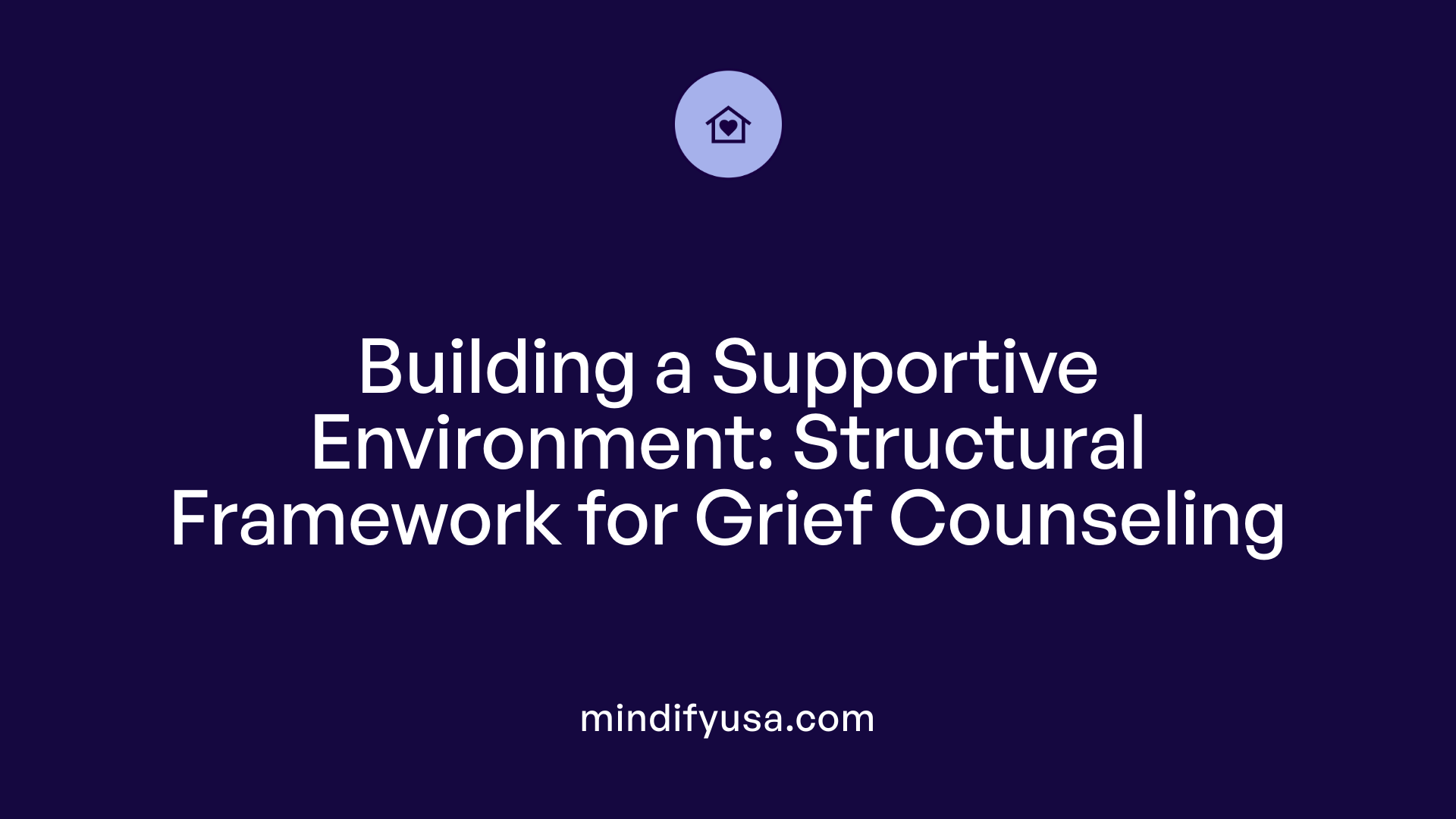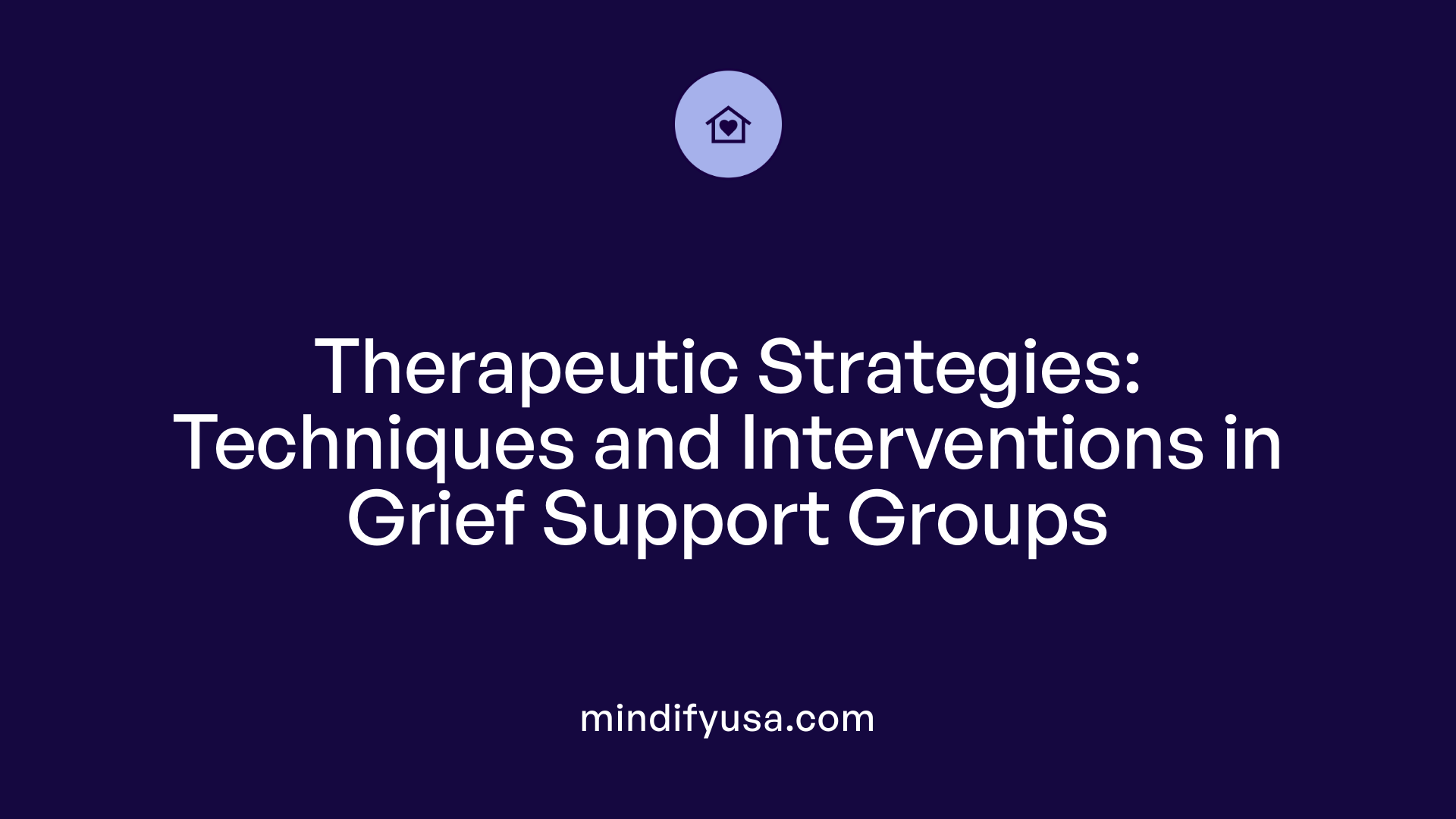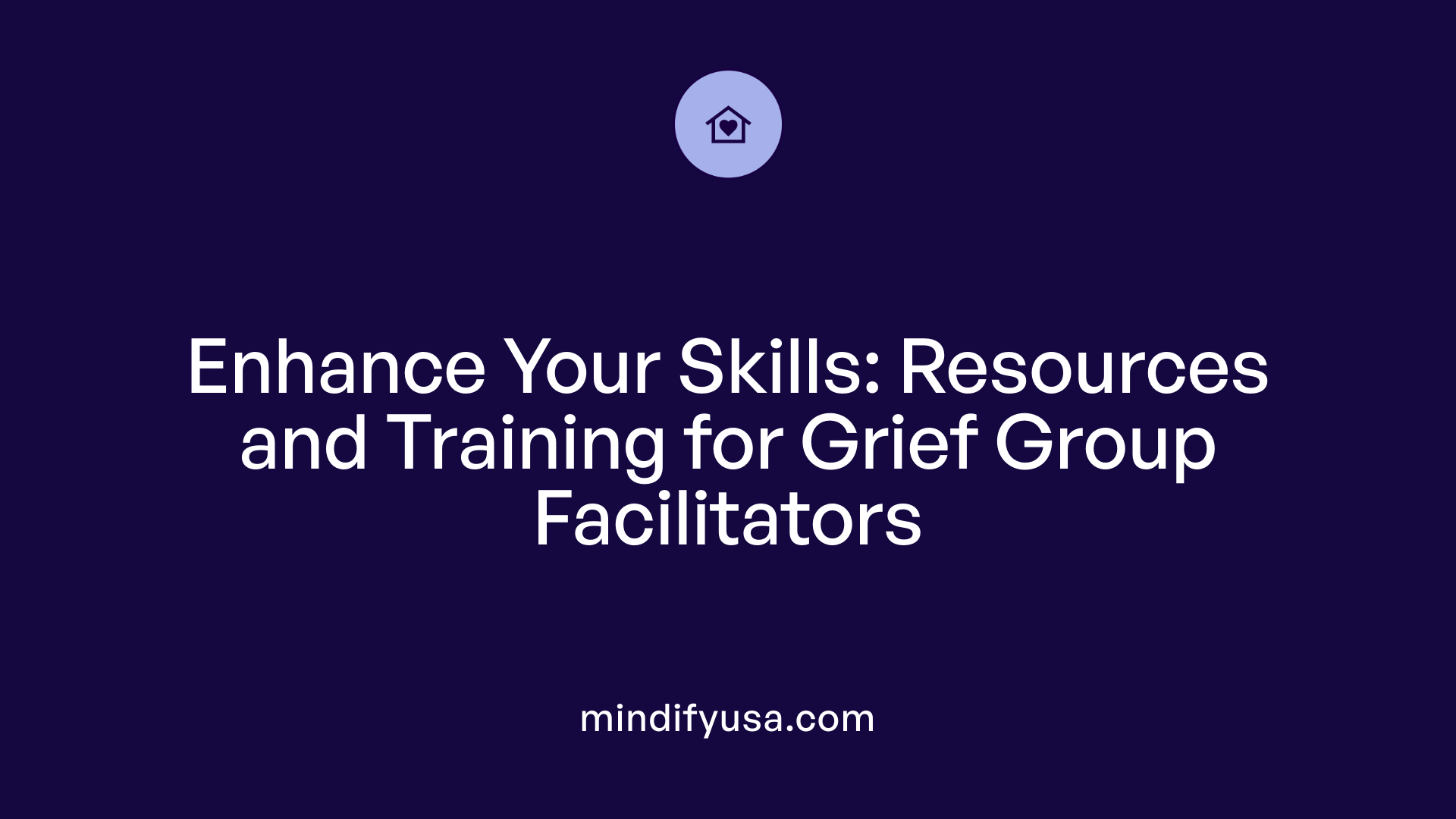Understanding the Foundations of Adult Grief Support
Adult grief support groups serve as vital spaces where individuals can process loss, share their experiences, and find solace in community. These groups are structured to foster emotional expression, normalize grief reactions, and equip participants with coping strategies. By exploring common components, themes, therapeutic techniques, and best practices, facilitators can create effective scripts that guide meaningful sessions tailored to adult mourners.
Core Components and Structural Framework of Adult Grief Groups

What are common components and structure of adult grief support group therapy?
Adult grief support groups are designed to provide a safe and structured environment where individuals can share their experiences and emotions following a loss. These groups are usually led by a qualified facilitator, such as a mental health professional, who encourages open communication and emotional expression.
A fundamental feature of these groups is facilitated meetings that promote sharing of personal experiences related to grief. Participants are encouraged to speak about their feelings, memories, and struggles, which helps normalize their reactions and reduces feelings of isolation.
Structured activities form a core part of these programs. This includes guided discussions around common themes like loneliness, anger, fear, regrets, and hope. Such discussions are often supported by multimedia resources, including video seminars presented by experts, as seen in programs like GriefShare. These videos introduce key topics and validate participants’ feelings, often followed by group discussions to deepen understanding.
In addition to discussions, participants typically work through personal workbooks designed specifically for grief support. These workbooks contain prompts, exercises, and reflection points that help individuals process their emotions and experiences. Discussion prompts encourage sharing personal stories while allowing members to connect their feelings to broader themes of loss.
To facilitate emotional healing, groups often incorporate evidence-based therapeutic exercises. Techniques such as imagery exercises, role-play, mindfulness practices like meditation, and writing letters to the deceased are used to help process complex feelings. These activities aim to normalize grief reactions, build resilience, and promote healthy coping strategies.
Overall, the goal of adult grief groups is to provide education on the grieving process, emotional support, and practical tools for adjustment. By fostering a sense of community and understanding, these groups enable participants to navigate their grief journey, maintain a meaningful connection with their loved ones, and ultimately find a path to healing.
Themes and Emotional Landscapes in Grief Support Sessions
 Adult grief support groups serve as vital spaces for individuals to explore and process the complex emotions that accompany loss. These sessions often delve into a range of emotional and thematic topics that reflect the depth and diversity of the grieving experience.
Adult grief support groups serve as vital spaces for individuals to explore and process the complex emotions that accompany loss. These sessions often delve into a range of emotional and thematic topics that reflect the depth and diversity of the grieving experience.
A primary focus is on understanding and coping with the feelings related to loss, such as sadness, anger, guilt, and memories of the loved one. Participants might discuss their personal experiences of grief, share stories, and reflect on the emotional impact of their loss. The groups also address difficult emotions like loneliness and fear, helping members feel less isolated in their pain.
Handling regrets and finding hope are recurring themes, guiding individuals through the process of making peace with what they cannot change while fostering a sense of optimism for the future. Discussions often emphasize normalizing grief reactions, reassuring participants that feelings such as crying, confusion, or mood swings are natural parts of healing.
Beyond emotional expression, these groups promote healthy coping mechanisms and strategies for adjusting to new life circumstances post-loss. Techniques such as active sharing, listening, and participating in educational exercises enable members to better manage their feelings and develop resilience.
Creating a safe and supportive environment is crucial. Group settings are designed to facilitate openness, where individuals feel free to express their thoughts without fear of judgment. Sharing personal stories and listening to others' experiences not only help normalize grief but also encourage mutual comfort and understanding.
In summary, adult grief support groups explore themes of loss, emotional pain, memories, and hope, with a strong emphasis on emotional processing and social connection. These sessions aim to guide participants through their unique journeys, offering comfort and practical tools to navigate the often unpredictable landscape of grief.
Effective Therapeutic Techniques and Interventions in Group Settings
 What therapeutic techniques and interventions are effective in adult grief group settings?
What therapeutic techniques and interventions are effective in adult grief group settings?
Adult grief groups utilize a variety of techniques aimed at helping individuals process their loss, express their emotions, and develop healthy coping strategies. Central to these approaches is active listening and psychoeducation. Facilitators guide participants through understanding the typical reactions to grief, normalizing their feelings such as sadness, anger, or loneliness, and providing insights into the grief process.
Narrative sharing plays a crucial role, encouraging members to tell their stories and reflect on their experiences. This openness fosters emotional expression and helps participants make sense of their loss within the group setting.
In addition, incorporating healthy coping strategies can significantly enhance healing. Techniques like grounding exercises help manage overwhelming emotions, while rituals and creative activities—such as drawing, writing letters to the deceased, or engaging in memorial crafts—offer meaningful outlets for emotional processing.
Evidence-based therapies are often integrated into group interventions. Cognitive Behavioral Therapy (CBT) aids in modifying negative thought patterns associated with grief. Meaning-Centered Grief Therapy (MCGT) helps participants find purpose and develop a renewed sense of meaning. Interpersonal Psychotherapy (IPT) addresses relationship adjustments, and Complicated Grief Treatment (CGT) offers specialized support for those experiencing prolonged or intense grief reactions.
Facilitators also employ specific techniques like role-play, imagery exercises, metaphors, and evocative language to deepen emotional engagement and facilitate understanding. Role-playing scenarios can prepare individuals for upcoming life changes or conversations, while imagery and metaphors make abstract grief concepts more tangible.
Models such as the dual process model guide intervention strategies, oscillating participants between loss-oriented activities—such as mourning and emotional expression—and restoration-oriented tasks like rebuilding daily routines or exploring new roles.
Overall, these interventions aim to provide a comprehensive, supportive environment where adults confronting grief can process their emotions, find resilience, and adapt to life after loss.
Sample Scripts and Facilitation Guidelines for Support Groups
When leading adult grief support groups, having access to detailed scripts and guidelines can be immensely helpful. These resources often come from organizations like the National Bereavement Alliance and provide a structured framework for each session. They include prompts to facilitate open discussion, grounding exercises to help participants stay connected to the present, and activities such as letter writing or the creation of memorials to honor loved ones.
Facilitators are encouraged to adapt these scripts to the cultural backgrounds and individual needs of group members. Tailoring discussions and activities ensures that everyone feels respected and understood, fostering a safe space for mourning.
Effective facilitation involves employing strategies like active listening and empathetic responses. These techniques help participants feel heard and validated, which is essential for emotional healing. Creating an environment of trust and acceptance allows members to explore their feelings without fear of judgment.
Incorporating specific techniques such as role-play exercises can help individuals experience different perspectives and rehearse coping strategies. Imagery techniques, like guided visualization, can promote relaxation and emotional regulation. Cognitive restructuring helps challenge unhealthy thought patterns, encouraging a healthier outlook on grief.
Guidelines for facilitators also emphasize the importance of maintaining a compassionate atmosphere, where emotions are welcomed and validated. Facilitators should be attentive to signs of emotional distress and be prepared to provide additional support or referrals when necessary.
Overall, these scripts and guidelines serve to empower facilitators to lead meaningful, supportive sessions that help participants navigate their grief journey. The goal is to foster resilience, encourage healthy coping, and facilitate healing in a compassionate, empathetic setting.
For those interested, searching for "Facilitator scripts and guidelines for grief groups" online can yield valuable resources for setting up or improving support group sessions.
Training and Resources for Effective Facilitation
 If you're interested in leading adult grief support groups, developing your skills through proper training and resource gathering is essential.
If you're interested in leading adult grief support groups, developing your skills through proper training and resource gathering is essential.
Participating in facilitator training programs provides foundational knowledge and practical strategies. Many organizations offer specialized courses, such as the online 'Grief Support Group Facilitator' program, which equips facilitators with tools tailored for various populations and settings. These programs often include modules on structuring sessions, managing group dynamics, and addressing complex emotional responses.
Workshops led by experienced grief professionals like Dr. Alan Wolfelt are highly valuable. Dr. Wolfelt’s teachings emphasize compassionate companioning, understanding grief processes, and effective facilitation techniques. Attending such workshops in person or online can deepen your understanding and enhance your skills.
Professional certifications can also strengthen your credentials. Certifications from organizations like the National Board for Certified Counselors (NBCC), the National Association of Social Workers (NASW), or specific state licensing boards often include continuing education credits that qualify for professional development requirements.
Reading authoritative grief literature and guides is another effective step. Resources authored by grief experts provide insights into emotional reactions, coping strategies, and facilitation methods. Books, ebooks, and scholarly articles serve as valuable reference materials.
Seeking mentorship and supervision from seasoned grief counselors can accelerate your learning. Experienced professionals can offer guidance, feedback, and support, helping you navigate complex situations and refine your approach.
Attending both in-person and online training sessions offers flexible opportunities for skill development. Many organizations host regular workshops, webinars, and conferences that facilitate hands-on learning and networking.
Joining professional communities dedicated to grief support and counseling allows for ongoing education, resource sharing, and peer support. Membership in these groups can keep you informed about latest research, certification opportunities, and best practices.
To find comprehensive training resources, searching with queries like "Training resources for grief group facilitators" can lead you to valuable programs, organizations, and literature that support your journey as an effective facilitator.
Best Practices for Structuring Grief Counseling in Groups
What are best practices for structuring adult grief counseling in a group setting?
Effective adult grief counseling in a group environment relies on establishing a foundation of safety and trust. Facilitators should create a supportive space where sharing is encouraged, and confidentiality is strongly emphasized. Setting clear ground rules helps foster an atmosphere of respect and openness, allowing participants to feel secure in expressing their feelings.
A structured approach to sessions helps guide participants through the grief process. Common session objectives focus on key stages: accepting the reality of loss, processing emotional pain, adjusting to life without the loved one, and maintaining a continuing bond. These goals serve as milestones to help individuals see progress and understand their grief journey.
Incorporating various therapeutic techniques deepens engagement. Active listening, the use of metaphors and symbols, and cognitive restructuring are some methods that facilitate understanding and emotional expression. These approaches are adaptable to individual needs, making sessions more meaningful.
Facilitators should employ multiple therapeutic approaches—such as psychodynamic, interpersonal, and cognitive-behavioral—to tailor interventions. This flexibility is especially important when addressing complex or prolonged grief, ensuring each participant’s unique experience is acknowledged.
Consistent facilitation is vital. Leaders act as role models by demonstrating openness and empathy, encouraging participants to do the same. Systematic management of group dynamics, including balanced participation and confidentiality, maintains a safe environment.
Educational content and self-care exercises are integrated to equip participants with coping strategies. Sharing personal experiences and encouraging peer support help validate feelings and foster communal resilience.
By combining these practices, grief groups can effectively support adults as they navigate their mourning, leading to healthier adjustment and healing.
Fostering Healing and Resilience in Adult Grief Support
Adult grief support groups, when effectively structured and facilitated, serve as powerful tools for healing. By understanding key components such as thematic focus, therapeutic interventions, scripting, and best practices in group management, facilitators can foster an environment conducive to emotional expression, support, and growth. These groups not only normalize the complex emotions associated with loss but also equip participants with resilience and hope to navigate their continued journey of life without their loved ones.
References
- GriefShare: Need Help Dealing with Grief?
- 10 Grief Counseling Therapy Techniques & Interventions
- Grief Support Groups in New York, NY
- Grief Support Groups | VNS Health | New York
- Grief and Loss Resources - Maryland Department of Health
- Grief Support Groups
- 10 Grief Counseling Therapy Techniques & Interventions
- Group Counseling for Complicated Grief: A Literature Review
- Running a Grief Support Group
- 5 best practices for embedding bereavement and grief ...





































































































